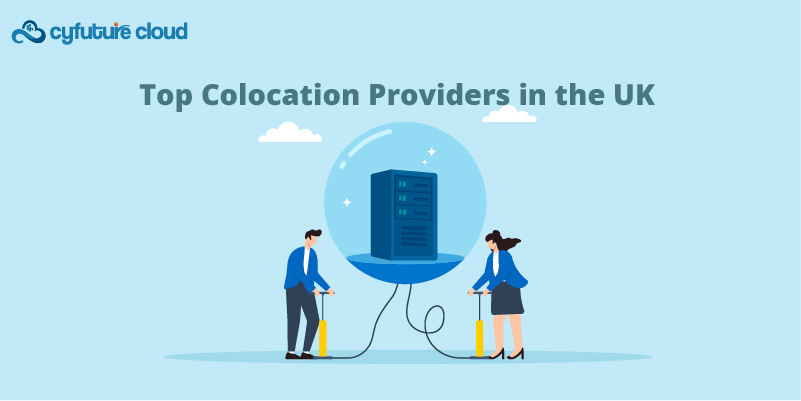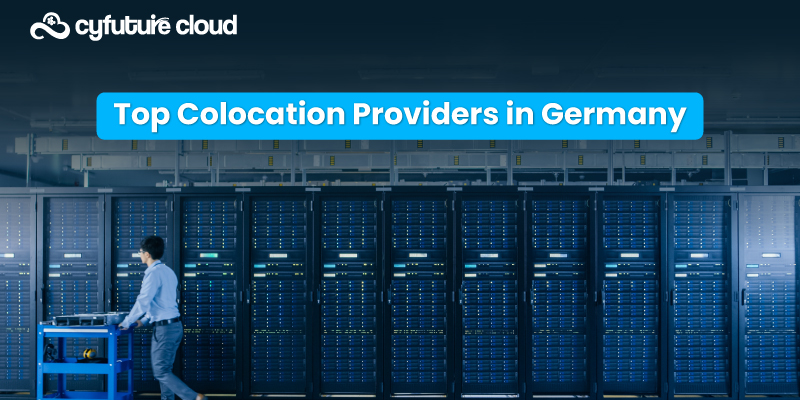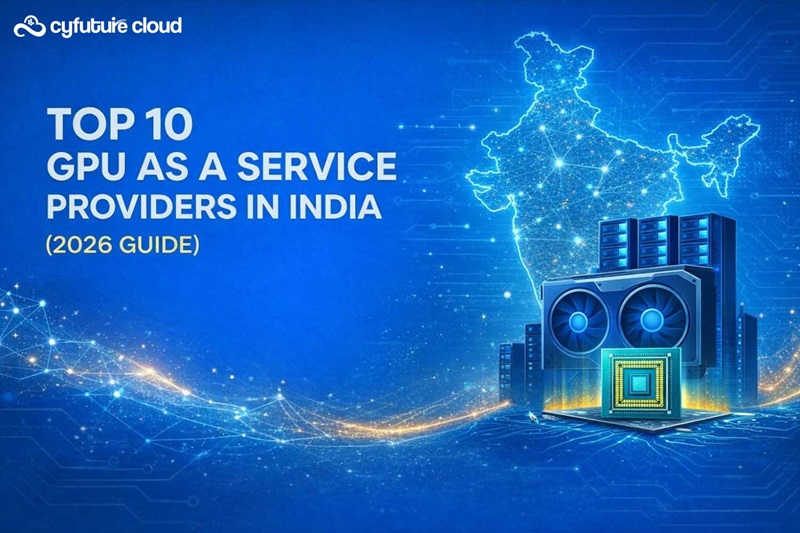Table of Contents
- Struggling to Find the Perfect Storage as a Service Solution for Your Business?
- What is Storage as a Service (STaaS)?
- 15 Best Storage as a Service Solutions for Businesses
- Comprehensive Comparison Table
- Cyfuture Cloud – Leading Indian Cloud Storage Provider
- Amazon Web Services (AWS) S3
- Microsoft Azure Blob Storage
- Google Cloud Storage
- IBM Cloud Object Storage
- Oracle Cloud Infrastructure Object Storage
- Alibaba Cloud Object Storage Service (OSS)
- Wasabi Hot Cloud Storage
- Backblaze B2 Cloud Storage
- DigitalOcean Spaces
- Linode Object Storage
- Vultr Object Storage
- StorageGRID by NetApp
- Hitachi Vantara Object Storage
- Pure Storage FlashBlade
- Market Trends and Statistics Shaping Storage as a Service
- Key Selection Criteria for Storage as a Service Solutions
- Future Trends in Storage as a Service
- Frequently Asked Questions (FAQs)
- What is the difference between Storage as a Service and traditional cloud storage?
- How do I calculate the total cost of ownership for STaaS solutions?
- What security measures should I look for in a STaaS provider?
- How does data sovereignty affect STaaS selection?
- What’s the typical migration timeline for moving to STaaS?
- How do I ensure business continuity during STaaS migration?
- What performance monitoring should I implement for STaaS?
- Can I use multiple STaaS providers simultaneously?
- How does STaaS handle disaster recovery and business continuity?
- Transform Your Storage Infrastructure with Advanced STaaS Solutions
Struggling to Find the Perfect Storage as a Service Solution for Your Business?
Storage as a Service (STaaS) represents a revolutionary cloud-based approach that allows businesses to rent storage infrastructure on-demand, eliminating the need for expensive on-premises hardware investments. This scalable solution provides enterprises with flexible, cost-effective storage that grows with their business needs while ensuring data security and accessibility.
The digital transformation wave has fundamentally changed how businesses handle data storage. Companies are generating unprecedented amounts of data – and here’s the thing: traditional storage methods simply can’t keep up.
With the Storage As A Service Market projected to grow from USD 93.99 Billion in 2025 to USD 408.14 Billion by 2034, exhibiting a CAGR of 17.72%, businesses are rapidly shifting toward cloud-based storage solutions.
But here’s where it gets interesting…
Choosing the right STaaS provider can make or break your data strategy. That’s exactly why we’ve compiled this comprehensive guide to the 15 best storage as a service solutions that are transforming how businesses store, manage, and scale their data infrastructure.

What is Storage as a Service (STaaS)?
Storage as a Service (STaaS) is a cloud computing model where storage resources are provided over the internet on a subscription basis. Instead of purchasing and maintaining physical storage hardware, businesses can access storage capacity remotely through their service provider’s infrastructure.
Key characteristics of STaaS include:
- On-demand scalability: Instantly adjust storage capacity based on business requirements
- Pay-as-you-use pricing: Only pay for the storage capacity you actually consume
- Managed infrastructure: Service providers handle maintenance, updates, and security
- Multi-tenancy: Shared resources across multiple customers for cost efficiency
- API integration: Programmatic access for automated data management
Now, let’s dive into the top 15 storage as a service solutions that are revolutionizing enterprise data management.
15 Best Storage as a Service Solutions for Businesses
Comprehensive Comparison Table
|
Provider |
Starting Price |
Free Tier |
API Compatibility |
Key Strength |
Best For |
|
Cyfuture Cloud |
₹0.50/GB/month |
Yes (10 GB) |
REST API |
Local presence + cost-effectiveness |
Indian businesses |
|
AWS S3 |
$0.023/GB/month |
5 GB for 12 months |
S3 API (Native) |
Global scale + reliability |
Large enterprises |
|
Azure Blob Storage |
$0.018/GB/month |
5 GB for 12 months |
Azure API |
Microsoft integration |
Microsoft-centric orgs |
|
Google Cloud Storage |
$0.020/GB/month |
5 GB always free |
Cloud Storage API |
AI/ML integration |
Data-driven businesses |
|
IBM Cloud Object Storage |
Custom pricing |
25 GB for lite plan |
S3 compatible |
Enterprise compliance |
Regulated industries |
|
Oracle Cloud OCI |
$0.0255/GB/month |
10 GB always free |
Oracle API |
Database integration |
Oracle environments |
|
Alibaba Cloud OSS |
$0.020/GB/month |
5 GB for 12 months |
OSS API |
Asian market presence |
Asian businesses |
|
Wasabi |
$5.99/TB/month |
30-day free trial |
S3 compatible |
No egress fees |
Frequent access use cases |
|
Backblaze B2 |
$5/TB/month |
10 GB always free |
S3 compatible |
Transparent pricing |
SMB, developers |
|
DigitalOcean Spaces |
$5/month (250GB) |
No |
S3 compatible |
CDN integration |
Web applications |
|
Linode Object Storage |
$5/month (250GB) |
No |
S3 compatible |
High performance |
Developer-focused |
|
Vultr Object Storage |
Variable |
No |
S3 compatible |
Global presence |
Global distribution |
|
NetApp StorageGRID |
Enterprise pricing |
No |
S3 compatible |
Petabyte scale |
Large enterprises |
|
Hitachi Vantara |
Enterprise pricing |
No |
Various APIs |
Advanced analytics |
Data-centric orgs |
|
Pure Storage FlashBlade |
Premium pricing |
No |
Various APIs |
All-flash performance |
High-performance computing |
Cyfuture Cloud – Leading Indian Cloud Storage Provider
Cyfuture Cloud stands at the forefront of India’s cloud revolution, offering enterprise-grade storage solutions that combine affordability with performance. With two data centers in India and specialized expertise in enterprise cloud storage, Cyfuture Cloud has established itself as a trusted partner for businesses across India, USA, and UK.
Key Features:
- High-performance cloud servers with blazing fast speeds
- 24/7 technical support and managed services
- Cost-effective pricing tailored for Indian businesses
- API-driven storage management
- Advanced security protocols and compliance
- Scalable infrastructure supporting rapid business growth
Pricing: Starting from ₹0.50 per GB/month with flexible pay-as-you-use models
Best For: Indian enterprises, startups, and businesses looking for cost-effective cloud storage with local data center presence
Why Choose Cyfuture Cloud:
“In today’s competitive landscape, businesses need storage solutions that don’t just store data but accelerate growth. Cyfuture Cloud’s combination of local expertise and global standards makes it an ideal choice for Indian businesses.” – Industry Expert Review
Amazon Web Services (AWS) S3
AWS S3 remains the gold standard for object storage, serving millions of applications worldwide. With 99.999999999% (11 9’s) durability, S3 offers unmatched reliability for business-critical data.
Key Features:
- Multiple storage classes for different access patterns
- Advanced encryption and security features
- Global content delivery network integration
- Comprehensive analytics and monitoring tools
- Lifecycle management for automated data optimization
Pricing: Pay-as-you-go starting from $0.023 per GB for standard storage
Best For: Large enterprises, applications requiring global scale, and businesses with complex data lifecycle requirements
Microsoft Azure Blob Storage
Azure Blob Storage delivers enterprise-grade object storage with seamless integration into Microsoft’s ecosystem. It’s particularly powerful for organizations already using Microsoft 365 or Azure services.
Key Features:
- Hot, cool, and archive storage tiers
- Advanced threat protection and encryption
- Seamless integration with Microsoft products
- AI-powered data analytics capabilities
- Hybrid cloud connectivity options
Pricing: Tiered pricing starting from $0.018 per GB for cool storage
Best For: Microsoft-centric organizations, enterprises requiring hybrid cloud solutions
Google Cloud Storage
Google Cloud Storage leverages Google’s global infrastructure to provide consistently fast performance and innovative AI/ML integration capabilities.
Key Features:
- Automatic multi-regional replication
- Advanced AI and machine learning integrations
- Comprehensive data analytics tools
- Strong security with customer-managed encryption keys
- Carbon-neutral storage infrastructure
Pricing: Flexible pricing starting from $0.020 per GB for standard storage
Best For: Data-driven organizations, businesses leveraging AI/ML, and environmentally conscious companies
IBM Cloud Object Storage
IBM Cloud Object Storage offers enterprise-grade features with advanced data protection and compliance capabilities, making it ideal for regulated industries.
Key Features:
- Information Dispersal Algorithm (IDA) for data protection
- Immutable object storage for compliance
- Advanced threat detection and response
- Multi-cloud and hybrid deployment options
- Enterprise-grade SLA guarantees
Pricing: Competitive pricing with volume discounts for enterprise customers
Best For: Regulated industries, enterprises requiring advanced compliance features
Oracle Cloud Infrastructure Object Storage
Oracle’s object storage provides high-performance, secure storage with strong integration capabilities for Oracle database environments.
Key Features:
- High-performance computing integration
- Advanced database connectivity
- Comprehensive security and compliance tools
- Multi-cloud interoperability
- Cost-effective data archival solutions
Pricing: Predictable pricing with generous free tier offerings
Best For: Oracle database users, enterprises requiring high-performance computing integration
Alibaba Cloud Object Storage Service (OSS)
Alibaba Cloud OSS dominates the Asian market with robust performance and competitive pricing, particularly strong in the Chinese and Southeast Asian regions.
Key Features:
- Global content delivery network
- Advanced data processing capabilities
- Strong regional presence in Asia
- Comprehensive API ecosystem
- Cost-effective data transfer options
Pricing: Competitive pricing optimized for Asian markets
Best For: Businesses operating in Asia, companies targeting Chinese markets
Wasabi Hot Cloud Storage
Wasabi positions itself as the “hot” alternative to traditional cloud storage, offering consistent high-performance access without complex tiering structures.
Key Features:
- Single tier “hot” storage for all data
- No egress fees or API charges
- 99.999999999% data durability
- Immutable storage for compliance
- Simple, predictable pricing model
Pricing: $5.99 per TB/month with no additional fees
Best For: Businesses requiring frequent data access, organizations seeking predictable costs
Backblaze B2 Cloud Storage
Backblaze B2 offers developer-friendly object storage with transparent pricing and robust API capabilities.
Key Features:
- S3-compatible API for easy migration
- Transparent, simple pricing structure
- High-performance global network
- Native integration with popular applications
- Comprehensive monitoring and analytics
Pricing: $5 per TB/month with competitive egress pricing
Best For: Developers, small to medium businesses, backup and archival use cases
DigitalOcean Spaces
DigitalOcean Spaces provides developer-focused object storage with seamless integration into DigitalOcean’s cloud ecosystem.
Key Features:
- Built-in CDN for global content delivery
- S3-compatible API for easy integration
- Simple, developer-friendly interface
- Integrated with DigitalOcean’s cloud services
- Predictable pricing structure
Pricing: $5 per month for 250 GB with 1 TB outbound transfer
Best For: Developers, startups, web applications requiring CDN integration
Linode Object Storage
Linode Object Storage offers high-performance storage with strong integration capabilities within Linode’s cloud infrastructure.
Key Features:
- High-speed SSD storage infrastructure
- S3-compatible API for seamless integration
- Multi-datacenter deployment options
- Advanced security and encryption features
- 24/7 technical support
Pricing: $5 per month for 250 GB of storage
Best For: Linode ecosystem users, developers requiring high-performance storage
Vultr Object Storage
Vultr Object Storage provides global object storage with competitive pricing and high-performance infrastructure.
Key Features:
- Global network of data centers
- S3-compatible API for easy migration
- High-performance SSD infrastructure
- Advanced security features
- Simple management interface
Pricing: Competitive per-GB pricing with global availability
Best For: Global businesses, applications requiring worldwide data distribution
StorageGRID by NetApp
NetApp StorageGRID offers enterprise-grade object storage designed for large-scale, data-intensive applications.
Key Features:
- Petabyte-scale storage capabilities
- Advanced data lifecycle management
- Multi-site data protection and replication
- Comprehensive compliance and governance tools
- High-performance metadata management
Pricing: Enterprise licensing with volume-based pricing
Best For: Large enterprises, data-intensive applications, organizations with strict compliance requirements
Hitachi Vantara Object Storage
Hitachi Vantara provides enterprise object storage solutions with advanced data management and analytics capabilities.
Key Features:
- Scalable architecture supporting exabyte capacity
- Advanced data analytics and insights
- Comprehensive data lifecycle management
- Multi-cloud integration capabilities
- Enterprise-grade security and compliance
Pricing: Custom enterprise pricing based on requirements
Best For: Large enterprises, data-centric organizations, businesses requiring advanced analytics
Pure Storage FlashBlade
Pure Storage FlashBlade delivers all-flash object storage for high-performance applications requiring ultra-low latency.
Key Features:
- All-flash architecture for maximum performance
- Scale-out object storage capabilities
- Advanced data reduction technologies
- Comprehensive API ecosystem
- Enterprise-grade reliability and support
Pricing: Premium pricing for high-performance requirements
Best For: High-performance computing, analytics workloads, applications requiring ultra-low latency
Market Trends and Statistics Shaping Storage as a Service
The storage as a service landscape is experiencing unprecedented growth. Here’s what the numbers tell us:
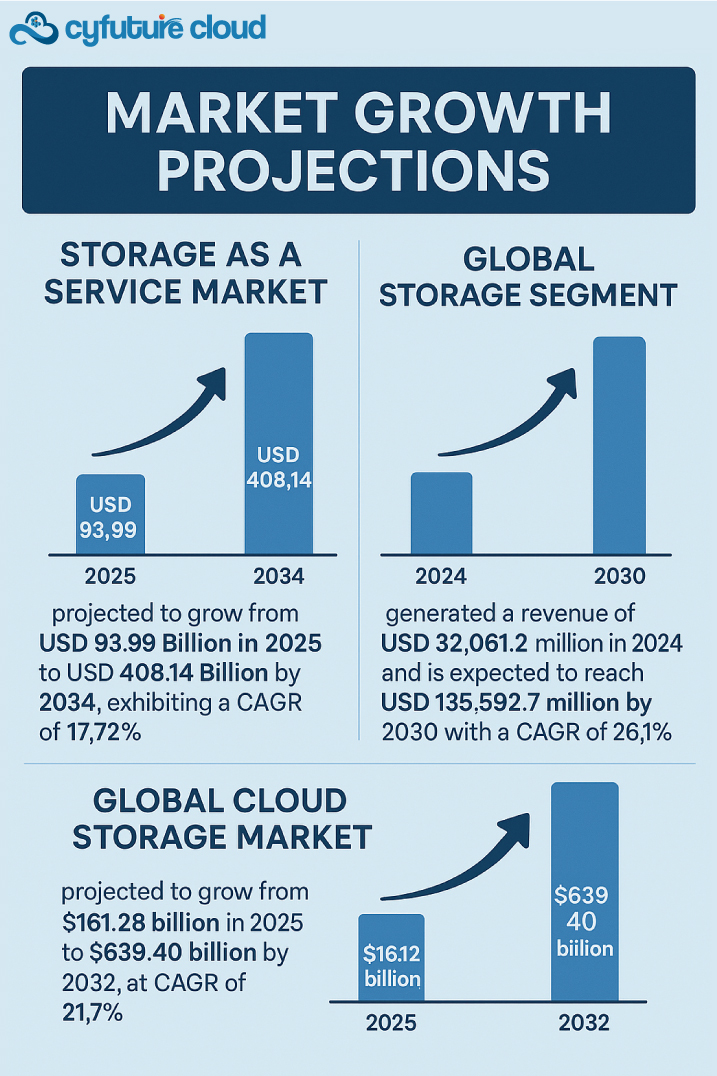
Key Industry Insights:
- India is expected to generate over 25 zettabytes of data annually by 2025, making it one of the fastest-growing digital economies
- Block storage dominated the market in 2024 with revenue over USD 20 billion, while object storage is the fastest-growing segment with projected CAGR of 9.7%
These statistics underscore the critical importance of selecting the right STaaS provider for your business’s long-term success.
Key Selection Criteria for Storage as a Service Solutions
Performance and Reliability
When evaluating STaaS providers, performance metrics should be your north star:
- Latency: Look for sub-millisecond response times for frequently accessed data
- Throughput: Ensure the provider can handle your peak data transfer requirements
- Durability: Aim for 99.999999999% (11 9’s) data durability guarantees
- Availability: Seek 99.9% or higher uptime SLAs with redundancy across multiple zones
Security and Compliance
Data security isn’t negotiable in today’s threat landscape:
- Encryption: Both at-rest and in-transit encryption should be standard
- Access Controls: Granular permission systems with role-based access
- Compliance: SOC 2, ISO 27001, GDPR, and industry-specific certifications
- Audit Trails: Comprehensive logging for all data access and modifications
Scalability and Flexibility
Your storage solution should grow with your business:
- Elastic Scaling: Automatic scaling based on demand without manual intervention
- Multi-tier Storage: Options for hot, warm, and cold data storage
- Global Presence: Multiple geographic regions for data locality and disaster recovery
- API Integration: Robust APIs for seamless application integration
Cost Optimization
Understanding the total cost of ownership is crucial:
- Transparent Pricing: Clear server pricing models without hidden fees
- Data Transfer Costs: Consider ingress and egress charges
- Storage Tiers: Match storage classes to your data access patterns
- Long-term Commitments: Volume discounts for predictable workloads
Future Trends in Storage as a Service
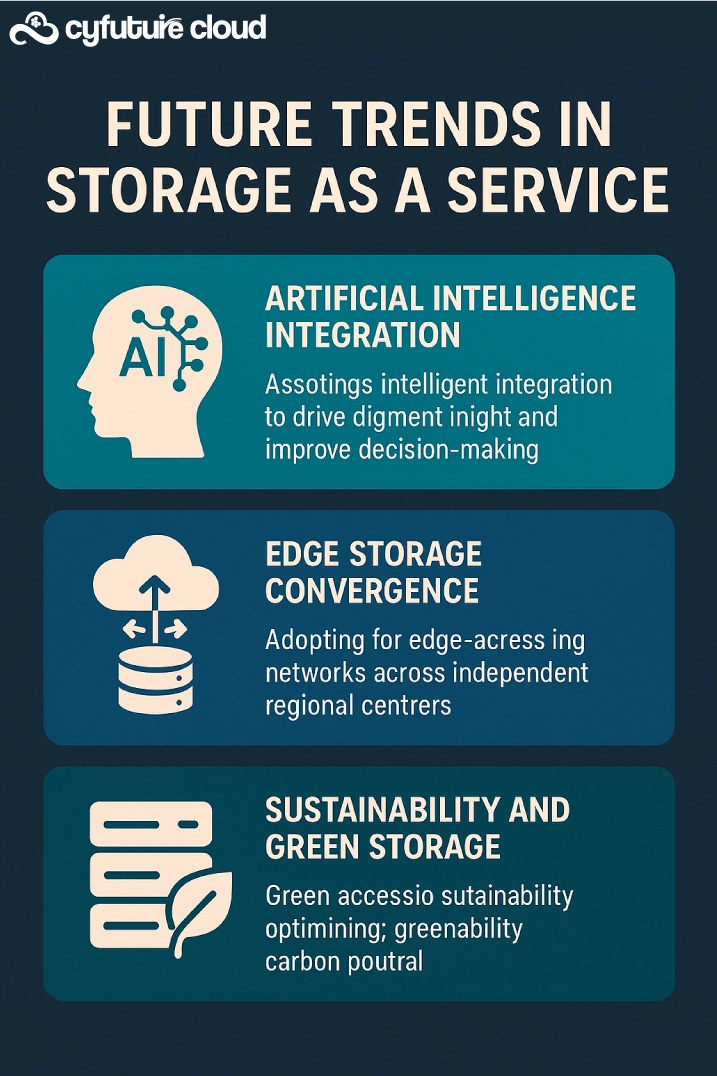
Artificial Intelligence Integration
AI is revolutionizing STaaS with intelligent data management:
- Predictive Analytics: AI-powered insights into future storage requirements
- Automated Optimization: Machine learning algorithms optimizing data placement and access patterns
- Intelligent Archiving: AI-driven decisions about data lifecycle management
- Anomaly Detection: Advanced threat detection using behavioral analysis
Edge Storage Convergence
The intersection of edge computing and STaaS is creating new opportunities:
- Distributed Storage Networks: Data storage closer to point of consumption
- Edge-to-Cloud Synchronization: Seamless data movement between edge and cloud storage
- Reduced Latency: Ultra-low latency access for critical applications
- Bandwidth Optimization: Intelligent data placement reducing network costs
Sustainability and Green Storage
Environmental consciousness is driving new STaaS innovations:
- Carbon-Neutral Storage: Providers investing in renewable energy and carbon offsetting
- Efficient Hardware: Next-generation storage systems with improved power efficiency
- Data Lifecycle Optimization: Automated policies reducing unnecessary data retention
- Sustainable Practices: Comprehensive environmental reporting and transparency
Frequently Asked Questions (FAQs)
What is the difference between Storage as a Service and traditional cloud storage?
Storage as a Service (STaaS) is a comprehensive managed service where the provider handles all aspects of storage infrastructure, including maintenance, security, and optimization. Traditional cloud storage typically requires more hands-on management and configuration from the customer. STaaS offers greater abstraction and automation, making it ideal for businesses wanting to focus on their core operations rather than storage management.
How do I calculate the total cost of ownership for STaaS solutions?
Calculate STaaS TCO by considering storage capacity costs, data transfer fees (ingress/egress), API request charges, additional services (backup, encryption), management overhead reduction, and avoided infrastructure costs. Most providers offer TCO calculators, but remember to factor in your specific usage patterns and growth projections for accurate estimates.
What security measures should I look for in a STaaS provider?
Essential security features include end-to-end encryption (at-rest and in-transit), multi-factor authentication, role-based access controls, compliance certifications (SOC 2, ISO 27001, GDPR), regular security audits, threat detection systems, data loss prevention capabilities, and comprehensive audit logging. Ensure the provider has a strong security track record and transparent incident response procedures.
How does data sovereignty affect STaaS selection?
Data sovereignty laws require certain data types to remain within specific geographic boundaries. Choose STaaS providers with data centers in your required regions and clear data residency policies. Providers like Cyfuture Cloud offer local data center presence, helping Indian businesses comply with data localization requirements while maintaining optimal performance.
What’s the typical migration timeline for moving to STaaS?
STaaS migration timelines vary based on data volume, complexity, and business requirements. Small businesses typically complete migrations in 2-4 weeks, while large enterprises may require 3-6 months. Factors affecting timeline include data volume, application dependencies, compliance requirements, team readiness, and chosen migration strategy (big bang vs. phased approach).
How do I ensure business continuity during STaaS migration?
Ensure business continuity by implementing parallel systems during transition, creating comprehensive backup strategies, establishing rollback procedures, conducting thorough testing in non-production environments, training staff on new systems, maintaining documentation, and coordinating closely with your STaaS provider’s migration team.
What performance monitoring should I implement for STaaS?
Key performance metrics include latency (response times), throughput (data transfer rates), availability (uptime percentages), error rates, storage utilization, cost optimization metrics, and user experience indicators. Implement automated alerting for critical thresholds and regular performance reviews to optimize configurations and costs.
Can I use multiple STaaS providers simultaneously?
Yes, many organizations adopt multi-cloud STaaS strategies for redundancy, cloud cost optimization, and avoiding vendor lock-in. However, this approach requires careful data management, consistent security policies, integration complexity management, and monitoring across multiple platforms. Consider using cloud management platforms to simplify multi-provider operations.
How does STaaS handle disaster recovery and business continuity?
Most STaaS providers offer built-in disaster recovery through geographic replication, automated backups, point-in-time recovery options, and high availability architectures. However, you should establish clear recovery time objectives (RTO) and recovery point objectives (RPO), test disaster recovery procedures regularly, and ensure your chosen provider’s capabilities align with your business continuity requirements.
Transform Your Storage Infrastructure with Advanced STaaS Solutions
The storage as a service revolution is reshaping how businesses approach data management. With market growth exploding at a 17.72% CAGR and organizations generating unprecedented volumes of data, selecting the right STaaS provider isn’t just a technical decision—it’s a strategic imperative that will define your competitive advantage.
Whether you’re a growing startup needing cost-effective scaling or a large enterprise requiring comprehensive compliance and performance guarantees, the providers in this guide offer solutions tailored to your specific needs. From Cyfuture Cloud’s cost-effective local expertise to AWS S3’s global scale, each solution brings unique strengths to address modern business challenges.
The key lies in understanding your specific requirements, growth trajectory, and operational constraints. Use the comparison table, selection criteria, and implementation best practices outlined in this guide to make an informed decision that will serve your organization for years to come.
Don’t let storage limitations constrain your business growth. The time to embrace Storage as a Service is now—and with the right provider partner, your data infrastructure will become a catalyst for innovation rather than a operational burden.

Recent Post
Send this to a friend

 Server
Colocation
Server
Colocation CDN
Network
CDN
Network Linux
Cloud Hosting
Linux
Cloud Hosting Kubernetes
Kubernetes Pricing
Calculator
Pricing
Calculator
 Power
Power
 Utilities
Utilities VMware
Private Cloud
VMware
Private Cloud VMware
on AWS
VMware
on AWS VMware
on Azure
VMware
on Azure Service
Level Agreement
Service
Level Agreement 
